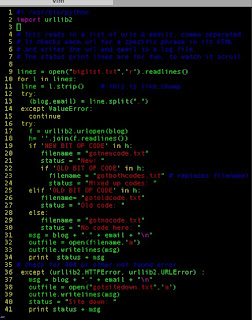This Washington Post writer suggests that blogs are not only unimportant, they are actively harmful to democracy and society. Therefore, the government should make them more expensive, so that regular people can't afford to have them.
And if that wasn't already lunatic enough, he proposes to do it by a massive energy tax.
This is so awesome I thought for a minute it was satire. Dusty Horwitt, pissant little environmentalist, lawyer, and journalist (and Bill Clinton impersonator, on the side) thinks blogging is the death of democracy.
Apparently democracy means a few rich people talk, while everyone listens. You... yes you... have the right to shut the hell up and be a good audience. Stop blogging! You're polluting the infosphere! You're killing newspapers, communities, democracy, and the environment, and if you're in the U.S., you're forcing jobs overseas! All by creating an "information avalanche". God knows we should all beg to go back to the days when we apparently sat around getting a political "education" from notorious anti-Semite and Hitler fan Charles Coughlin... as Horwitt suggests.
Here's Horwitt's argument:
1) The proliferation of blogs make it impossible to find relevant information
2) The only important information is "politics and news"
3) The Internet hurts newspapers
4) And Democracy!
5) Fragmented media outlets fragment society!
6) Personal computers, and data centers, are bad for the environment
7) Therefore, create an energy tax so regular people can't afford to have computers, and can't blog! That way, they'll shut up and listen to proper sources of information and become "educated".
So, regular people shouldn't have access to computers. This is a new one on me. Let's increase the digital divide, to.... empower people! and to Make America Great!
Rather than call for government regulation of technology itself, perhaps the best way to limit the avalanche is to make the technologies that overproduce information more expensive and less widespread.
Horwitt doesn't consider for a second that the rest of the world will still be posting, even if the U.S. makes it hard for people to have access to computers.
This is the best part,
It's possible that over time, an energy tax, by making some computers, Web sites, blogs and perhaps cable TV channels too costly to maintain, could reduce the supply of information. If Americans are finally giving up SUVs because of high oil prices, might we not eventually do the same with some information technologies that only seem to fragment our society, not unite it? A reduced supply of information technology might at least gradually cause us to gravitate toward community-centered media such as local newspapers instead of the hyper-individualistic outlets we have now.
Horwitt seems to be an amateur comedian and songwriter. You'd think his attempts at comedy would help him write a better satire if that's what this is supposed to be. Or is it all an elaborate hoax, an enormous troll? He's also an "analyst" for the Environmental Working Group. Wonder how well his analysis is informing the EWG? I like this bit of their site - "How EWG Does It: Our research brings to light unsettling facts that you have a right to know." Hmmm. You have a right to know... What the likes of Dusty Horwitt want you to know. Apparently you don't have a right to speak.
The Washington Post just argues against Horwitt's big point that newspapers deserve to survive at all -- by having published this massive piece of bullshit. This is the legitimacy of mainstream, traditional media?
It'll serve this dude right to be mocked on as many blogs as possible. He thinks viral information doesn't work? Maybe a million pissed off bloggers will let him know otherwise. God, if only I could find his personal Myspace... I'm sure it's comedy gold.







